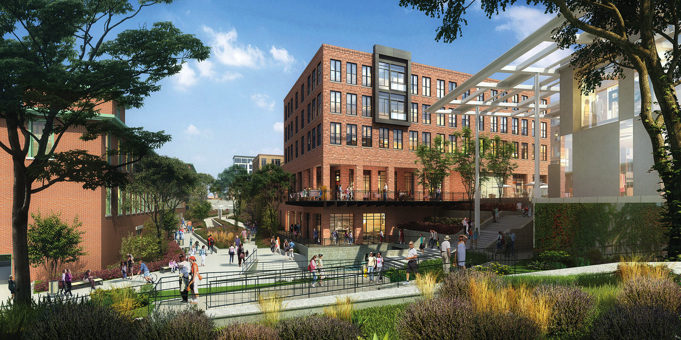The following is testimony that Dan Ruben gave to the Newton Zoning and Planning Committee on January 9, 2023. Dan is the Board Chair of Green Newton, and he leads the Green Newton Building Standards Committee.
Climate change is on track to shatter the lives of our young people well within their natural lifespan. What does this have to do with village center zoning? Plenty!
When we allow greater density in village centers, we enable people to live close to transit, work, restaurants, and shopping. Hence, they drive less—which reduces the greenhouse gas emissions that are so harmful to our children’s future.
When we build up and not out, people live on a small land print. When we build in existing village centers, few if any trees are cut down. When we fail to do that, we force home construction in further away suburbs and exurbs. More trees are cut down, and more forests are converted into lawns. Since trees bind up carbon dioxide, this leads to runaway climate change, too.
Newton is not alone, of course. The same prescription applies to Boston and all the close-in communities.
Denser zoning in village centers not only addresses the climate crisis. It also addresses the housing crisis that is so harmful to citizens who rent or want to be homeowners.
Governor Healey said this in her inaugural address, “The cost of housing is out of control because we simply don’t have enough of it. We need to build more places to live. High housing costs are unacceptable for our people, our businesses, and our state’s future…. That means building more housing next to transit hubs and taking another look at zoning…”
Governor Healey, of course, echoes former Governor Baker, who signed the MBTA Communities Law, which incentivizes communities to enable denser housing near transit stations.
The City of Newton’s Five-Year Climate Action Plan explicitly calls for actions like the Village Center Zoning proposal. One of its recommended actions is to “Work with the City Council to adopt Zoning Ordinances that encourage additional, appropriate low-carbon housing near public transportation.” This is our chance to enact this critical part of the CAP.
Let’s view the Village Center Zoning proposal through the eyes of our 20-year-old residents. How would we consider this proposal if we were 20 and wanted to be alive to see the year 2090?
First, we would be alarmed by the scope of climate change, and we would want our city leaders to take every action to address it. Perhaps we would know what UN Secretary-General Antonio Guterres said recently at the COP 27 climate change summit.
“We are in the fight of our lives, and we are losing…Greenhouse gas emissions keep growing, global temperatures keep rising, and our planet is fast approaching tipping points that will make climate chaos irreversible…We are on a highway to climate hell with our foot still on the accelerator.”
Second, if we were 20, we would know that when we’re ready to rent or buy, we might be priced out of the housing market and have to move away. Even if we could afford to live here, many of our friends could not.
Of course, the climate and housing crises will impact those younger than 20 even more. And even those who are 40 and hope to see the year 2070 should know that the climate crisis is on track to severely harm their lives, too.
So, if we were 20 and in the know, we would view the Village Center Zoning proposal as overly modest. But we wouldn’t want perfect to be the enemy of the good—and we would want that proposal to be enacted immediately.
The Green Newton Building Standards Committee stands with Engine 6 and the Chamber, supporting the two fundamental principles that are the foundation of Village Center Rezoning.
1) More housing near transit is effective climate action.
2) More housing combats rising housing prices.
I urge the City Council to enact the Village Center Zoning proposal as it stands—or strengthen it.
Let’s do it for our young people and everyone who will be impacted by the climate crisis and harmed by the housing crisis.
Thank you.



Recently on Twitter